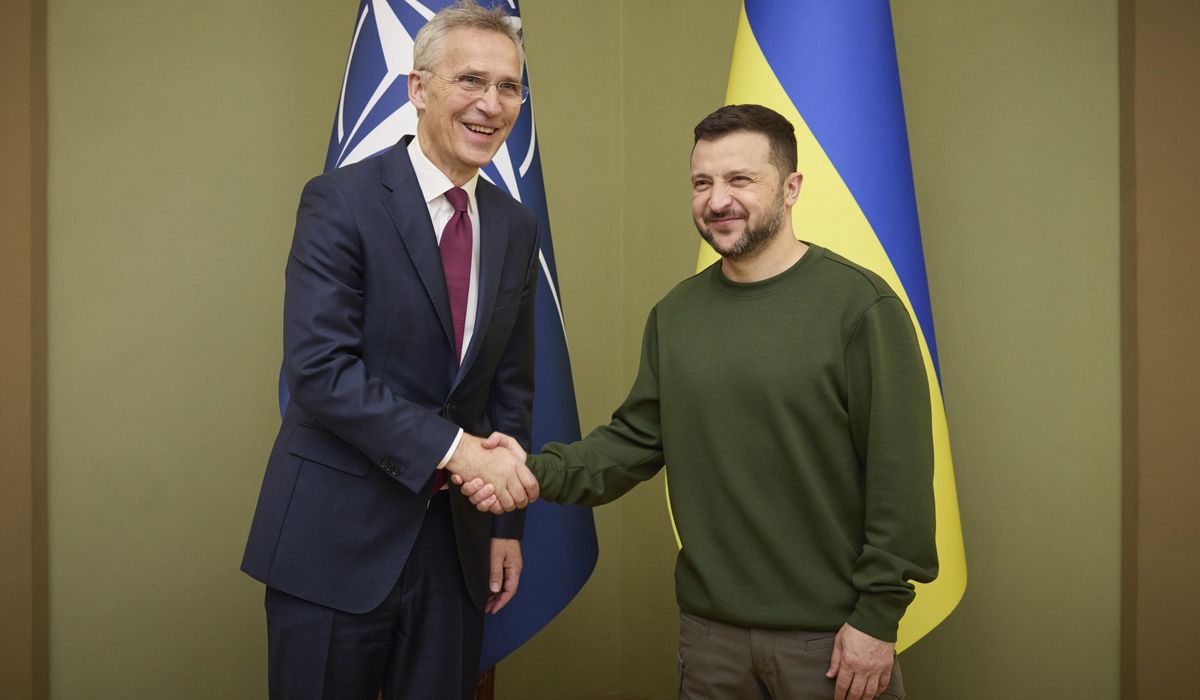


NATO Secretary General Jens Stoltenberg this week called on alliance members supplying weapons to Ukraine to lift restrictions on Kyiv using them to strike military targets inside Russia.
The announcement, coupled with new comments from French President Emmanuel Macron, places Mr. Stoltenberg at odds with NATO’s largest and most powerful member. President Joe Biden, while strongly pushing for military support for Ukraine, has not relented on his administration’s policy of limiting what targets are considered out of bounds for U.S.-supplied weapons systems.
U.S. officials have repeatedly expressed the concern that a more offensive use of Western aid could draw the NATO alliance into a direct conflict with a nuclear-armed Russia, which invaded Ukraine in February 2022 and still occupies about a fifth of the country.
Mr. Stoltenberg, who will step down in October after 10 years leading the NATO alliance, joined a growing list of international leaders who say Ukraine shouldn’t be hobbled by allowing Russia to operate with impunity from protected bases just across their border.
“Ukraine has, according to international law, the right to self-defense. The right of self-defense includes also striking targets outside Ukraine, legitimate military targets inside Russia,” Mr. Stoltenberg said Tuesday. “The most heavy fighting is now taking place in the Kharkiv region, close to the Ukrainian-Russian border, and part of the border is actually the front line.”
Targets inside Russia that could be legitimately attacked include missile launchers, artillery bases and airfields now being used to strike targets inside Ukraine, Mr. Stoltenberg said.
“If Ukraine cannot hit those military targets, it will be much harder for them to defend themselves,” he said.
The Biden administration has pushed back on any developments that it believed could escalate the war beyond Ukraine.
“There’s no change to our policy at this point. We don’t encourage or enable the use of U.S.-supplied weapons to strike inside Russia,” John Kirby, National Security Council spokesman, told reporters after Mr. Stoltenberg spoke Tuesday.
Secretary of State Antony Blinken insisted that the U.S. is committed to Ukraine’s ultimate victory over Russian invaders and has shown it through American taxpayers’ support.
“We haven’t encouraged or enabled strikes outside of Ukraine, but Ukraine … has to make its own decisions about the best way to effectively defend itself,” Mr. Blinken said Wednesday during a press conference in Moldova with President Maia Sandu. “We’re going to make sure that it has the equipment it needs to do that.”
Ukrainian President Volodomyr Zelenskyy this week urged the country’s allies to support “preemptive protections” aimed at military targets inside Russia.
“We can see every point where Russian troops are concentrated. We know all areas from which Russian missiles are launched and combat aircraft take off,” he said Sunday on his Telegram social messaging page. “Destroying this terrorist force, saving thousands of lives, and ensuring that the war does not expand is entirely a political decision that must be made.”
Other NATO members said they won’t dictate military targets for Kyiv, whether inside Ukraine or Russia. British Foreign Secretary David Cameron said London isn’t placing any such restrictions on the firepower it is providing.
“Ukraine has that right. Just as Russia is striking inside Ukraine, you can quite understand why Ukraine feels the need to make sure it’s defending itself,” Mr. Cameron told Reuters earlier this month.
France’s Mr. Macron has been the most outspoken European leader urging Western countries to give Ukraine the green light to strike legitimate Russian military targets with the weapons they have provided and has even said NATO should not rule out deploying its own forces to help Ukraine defend itself.
“We should allow them to neutralize military sites where missiles are fired [and] from where Ukraine is attacked,” Mr. Macron said, according to the Agence France-Press news agency. But “we should not allow them to touch other targets in Russia, and obviously civilian capacities.”
Even some former Biden administration officials are criticizing the White House’s restrictive policies. Victoria Nuland, who served as undersecretary of state for political affairs from 2021 to 2024, said Kyiv has the right to fully defend itself from Russian aggression.
“If the attacks are coming directly from over the line in Russia, those bases ought to be fair game — whether they are where missiles are being launched from or where troops are being supplied from,” Ms. Nuland said on May 19 on ABC’s “This Week” program. “It is time to give the Ukrainians more help hitting those bases in Russia.”
The Kremlin on Wednesday took sharp issue with Mr. Stoltenberg’s comments.
“NATO is flirting with military rhetoric and falling into military ecstasy,” Kremlin spokesman Dmitry Peskov told reporters in Moscow, according to the Reuters news agency. Asked if NATO was approaching a direct confrontation with Russia, Mr. Peskov replied, “They are not getting close. They are in it.”
• Mike Glenn can be reached at mglenn@washingtontimes.com.
